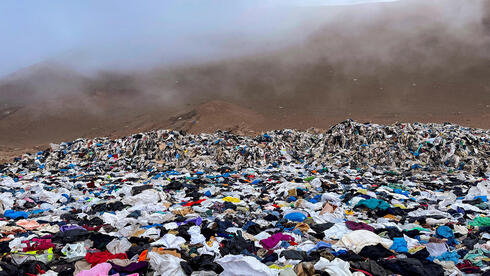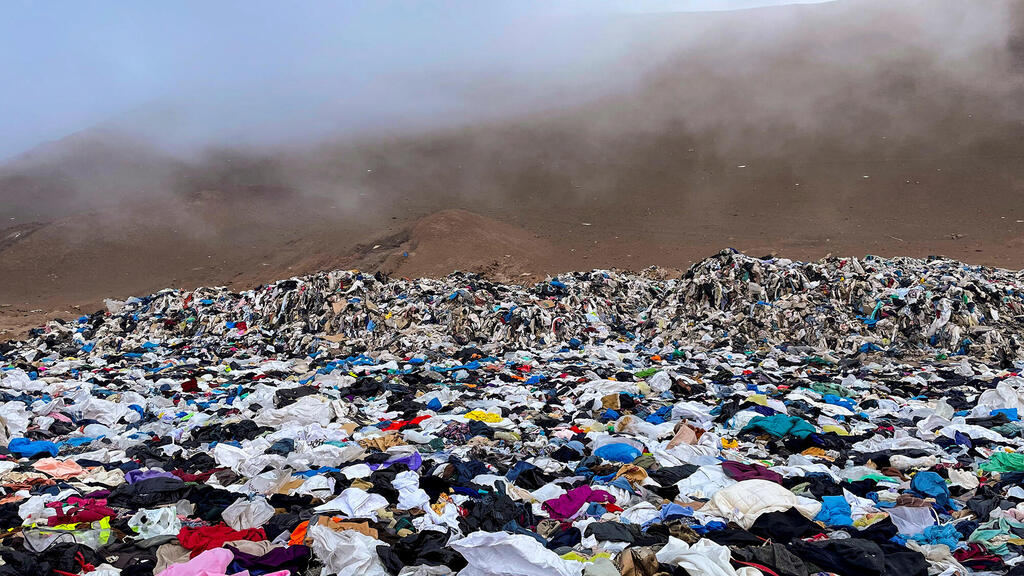
Fast fashion: To destroy the earth pay a total of $4.99
The low price of products by the latest fast fashion brand Temu doesn’t include the very high environmental price, including the airplanes distributing 1.6 million packages a day from China across the world, which emit 40 times more carbon than sea shipping
The giant Chinese retailer Temu is making consumers around the world open their wallets, and fast. For a small fee, consumers can fill their online shopping cart with everything they can find, and fill up the house with new products they never imagined they needed: earrings for 98 cents, handbags for 2.58 euros, hair clips in the shape of Danishes for $2.49 and 90% off on all other products. The cart has no bottom, and the delivery fees are on the house. But when the prices are so cheap, consumers don't ask who is paying the real price. The answer is the environment and the workers on the production line.
In a Deutsche Bank survey of American consumers, nearly a third said they would shop less at Walmart and Amazon because of Temu. They are attracted to variety and market-breaking prices, low even compared to low-cost chains. The company's slogan, "Shop like a billionaire," is a call to customers to buy everything they want without worrying about the cost, just like the rich, with an application that feels like it is tailored to your personal interests. But Temu's mechanism pushes consumers to buy indiscriminately in excess, even items they don't need. All products are treated like disposable utensils: they can be used once, or not, and thrown directly into the trash.
The cheap production of these items exacts a heavy environmental cost. Temu is not eager to disclose any information which may expose its environmental or social impact. The company doesn’t have a corporate responsibility report, and it pays even less attention to the issue than its strongest competitor Shein, which has been heavily criticized in recent years for its environmental impact. The little that can be inferred from the available data regarding Temu’s environmental damage is that the company sends 1.6 million packages per day worldwide from its factories via airplane - emitting 40 times more carbon emissions than maritime shipping.
Israelis participate in the consumer frenzy
Israelis, of course, are partaking in the frenzy. Temu burst into the Israeli market in mid-September with major marketing moves. The war slowed down the surge, but it has recently returned in full force. According to estimates, from the beginning of the year until the end of March, around 600,000 Temu packages arrived in Israel, surpassing Shein (although falling slightly behind AliExpress, of which about 3.5 million packages arrived in Israel during these months). Temu's success managed to shake AliExpress, which has responded with massive campaigns. According to Shopanalytics’ estimates, Temu's market share in Israel stands at 7%, similar to that of Shein and Next.
The environmental cost of fast fashion in Israel may be worse than in Western countries. "In our country we have less space, less advanced environmental regulation — no recycling, no environmental enforcement, resulting in significant textile and electronic waste in an unorganized manner," says Dr. Tamar Makov, head of the Circular Economy Lab at Ben-Gurion University. "Even if we recycle products, we lack sophisticated facilities to process them here. Eventually, we either bury the waste or send it abroad. Consider that every day there are numerous cars on the roads dedicated to distributing packages. How much do they add to fuel consumption and road congestion? Excessive consumerism ultimately leads to climate change, reduced biodiversity, water pollution, and air pollution. We're already seeing the consequences."
Excessive consumption rapidly depletes Earth's resources, generates mountains of waste and toxic substances — directly impacting our environment and health. As humanity grows, so does the damage. Global resource extraction increased by about 50% from 1985 to 2005, even before the rise of e-commerce and the trend of using once before throwing away products. Between 1970 and 2021, consumer spending in the U.S. increased by 400%, while the population increased by only 60%. Environmental damage has been the result. In the 1960s, for example, the average American purchased fewer than 25 garments annually. Today, the average American buys almost 70 pieces of clothing per year, or more than one new item per week. Last year, over 20 billion pairs of shoes were produced worldwide. Nearly 300 million of them end up in landfills in the US every year. Some of the materials used in these shoes will remain in landfills for a thousand years.
This consumption results in an increase in the use of coal, oil and gas, their combustion warming the atmosphere and causing a severe climate crisis, as well as a human and environmental crisis. Temu markets cheap products from over 80,000 suppliers in China, fueling its vast e-commerce platform. Their factories are hardly required to meet environmental and health standards, making their products very cheap for consumers. One example of the low standards of products that easily enter countries where the polluting industry is actually monitored: an investigation by Greenpeace Germany found that out of 47 Shein products, seven (15%) contained prohibited hazardous chemicals in the European Union and one-third of the products contained hazardous chemicals at alarming levels.
Temu flourishes amid high environmental awareness
In an era where environmental awareness is at its peak, businesses like Temu thrive. Even the conscious consumer succumbs to the prices and glamorous campaigns on social media. Dr. Makov explains how severe the implications are: "We feel like the product costs us a little in our pocket, but it costs us a lot in terms of chemical and plastic waste. Behind every electronic device or plastic item, there are kilograms of waste generated during its manufacturing process, even before it reaches us and quickly becomes waste. Most of the environmental impacts are completely invisible to us. Add to that the fact that it's flown to us. The fact that this product is so cheap also makes me care much less about it. We won't get upset about a child breaking even a functional product if it costs NIS 5. We don't treat this product with respect, and it survives only for a short time.
"The price of purchase doesn’t reflect the true cost of the products. If we were to take into account waste treatment, health problems, climate change costs — there's no such thing as a $5 product, especially not one flown from China to Israel. Almost always these are products that cannot be recycled, unlike a garment made of 100% cotton. Additionally, when it comes to fashion items, they also have no value as second-hand items, so they won't be reused."














